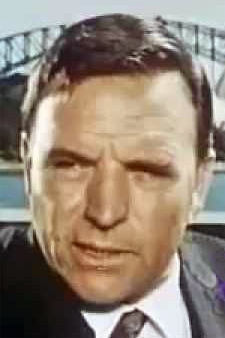Related Research Articles

Skippy the Bush Kangaroo is an Australian television series created by Australian actor John McCallum, Lionel (Bob) Austin and Lee Robinson produced from 1967 to 1969 about the adventures of a young boy and his highly intelligent pet kangaroo, and the various visitors to the fictional Waratah National Park, filmed in today's Waratah Park and adjoining portions of Ku-ring-gai Chase National Park near Sydney.

Edward Sidney Devereaux, better known professionally as Ed Devereaux, was an Australian actor, director, and scriptwriter who lived in the United Kingdom for many years. He was best known for playing the part of Matt Hammond the head ranger in the Australian television series Skippy the Bush Kangaroo. He was also involved in the series behind the scenes, Devereaux writing the script and directing the episode The Veteran (1969), for which he received much critical acclaim. Devereaux based the story of the episode "Double Trouble" on an idea conceived by his children, wrote the screenplay of "Summer Storm" and the script for "The Mine". He also played the part of Joe in the Australian 1966 film ‘They’re a Weird Mob’. The film was a local success.
Anne Mary Phelan was an Australian actress of stage and screen who appeared in many theatre, television and film productions as well as radio and voice-over.
Ronald Grant Taylor was an English-Australian actor best known as the abrasive General Henderson in the Gerry Anderson science fiction series UFO and for his lead role in Forty Thousand Horsemen (1940).
Edwin Dudley Roberts was an Australian television screenwriter and supervising producer.

Anthony David Morphett was an Australian screenwriter, who created or co-created many Australian television series, including Dynasty, Certain Women, Sky Trackers, Blue Heelers, Water Rats, Above the Law and Rain Shadow. Morphett wrote eight novels, and wrote or co-wrote seven feature films, ten telemovies, twelve mini-series, and hundreds of episodes of television drama, as well as devising or co-devising seven TV series. He won 14 industry awards for TV screenwriting.
Bill Bain was an Australian television and film director.
Richard Hamilton Lane (OAM), was an Australian writer known particularly for his skillful adaptation of plays and films for radio. He is often called the father of Australian radio drama. His career spanned over 60 years, and he is recognised not only for his writing achievements but for his contribution to the Australian Writers' Guild. He also wrote for television, and was described after his death as "luminary of the Australian radio and television industries".
Lee Robinson was an Australian producer, director and screenwriter who was Australia's most prolific filmmaker of the 1950s.

Neva Carr Glyn or Neva Carr Glynn was an Australian stage, film and radio actress born in Melbourne to Arthur Benjamin Carr Glyn, a humorous baritone and stage manager born in Ireland, and Marie Carr Glyn, née Marie Dunoon Senior, an actress with the stage name "Marie Avis". She had one half-sister Gwendoline Arnold O'Neill and two half-brothers Sacheverill Arnold Mola and Rupert Arnold Mola. She was named "Neva" after a great-aunt, who was a contralto of some quality. Both spellings of her surname appear in print roughly equally and apparently arbitrarily.
Riptide was an Australian adventure television series, starring Ty Hardin, which was first broadcast in 1969. The show featured a foreign lead actor and a foreign producer, similar in approach to the later series The Outsiders. Co-stars were Jonathan Sweet and Sue Costin, while guest roles featured Australian actors such as Tony Ward, Rowena Wallace, Michael Pate, Bill Hunter, Helen Morse, John Meillon, Norman Yemm, Chips Rafferty, and Jack Thompson. The series was filmed at Australian locations.
Rex Rienits was an Australian writer of radio, films, plays and TV. He was a journalist before becoming one of the leading radio writers in Australia. He moved to England in 1949 and worked for a number of years there. He later returned to Australia and worked on early local TV drama.
Ross Napier was one of Australia's leading radio and TV writers from the 1950s to 1990s, as well as an accomplished novelist. Born in Sydney in 1929, he began writing short stories for magazines while still in high school, selling his first script at 17. Shortly after, he became a staff writer for Grace Gibson Radio Productions, and during the 1950s and 1960s his radio serials were broadcast Australia-wide and internationally. This firmly established Napier as one of Australia's leading drama writers. Whilst at Gibson's he met Ann Fuller, who he married in 1953.
Australian Playhouse was an Australian anthology TV series featuring the work of Australian writers.
Patricia Hooker was an Australian writer who worked extensively in England. She wrote for TV, radio and the stage.
James Workman was a Scottish-born actor and writer who mostly worked in Australia.
Colin Free was an award-winning Australian writer best known for his work on television.
John Croyston was an Australian writer, radio producer and director.
Allan Trevor was an Australian actor, writer and producer.
Denys Burrows was an Australian actor and writer of books, radio and television. He is best known for his work in children's writing.
References
- ↑ "Talked about people". The Age. 29 June 1967. p. 11.
- ↑ Robinson, Harry (23 March 1968). "Writers choose the best men at their craft". The Sydney Morning Herald. p. 14.
- ↑ "Death notices". The Sydney Morning Herald. 20 November 1969. p. 46.
- ↑ Vagg, Stephen (29 August 2023). "Forgotten Australian Television Plays: Boy with Banner, Objector and Watch It". Filmink.